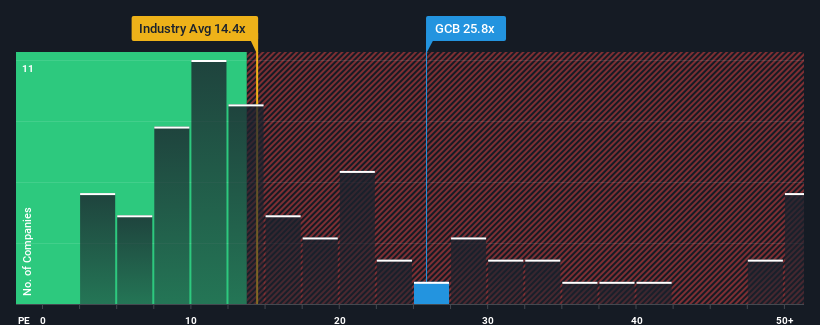After Leaping 34% Guan Chong Berhad (KLSE:GCB) Shares Are Not Flying Under The Radar
Guan Chong Berhad (KLSE:GCB) shareholders would be excited to see that the share price has had a great month, posting a 34% gain and recovering from prior weakness. But the gains over the last month weren't enough to make shareholders whole, as the share price is still down 9.0% in the last twelve months.
Following the firm bounce in price, Guan Chong Berhad's price-to-earnings (or "P/E") ratio of 25.8x might make it look like a strong sell right now compared to the market in Malaysia, where around half of the companies have P/E ratios below 16x and even P/E's below 10x are quite common. Although, it's not wise to just take the P/E at face value as there may be an explanation why it's so lofty.
While the market has experienced earnings growth lately, Guan Chong Berhad's earnings have gone into reverse gear, which is not great. One possibility is that the P/E is high because investors think this poor earnings performance will turn the corner. If not, then existing shareholders may be extremely nervous about the viability of the share price.
See our latest analysis for Guan Chong Berhad

What Are Growth Metrics Telling Us About The High P/E?
There's an inherent assumption that a company should far outperform the market for P/E ratios like Guan Chong Berhad's to be considered reasonable.
If we review the last year of earnings, dishearteningly the company's profits fell to the tune of 36%. This means it has also seen a slide in earnings over the longer-term as EPS is down 61% in total over the last three years. So unfortunately, we have to acknowledge that the company has not done a great job of growing earnings over that time.
Shifting to the future, estimates from the three analysts covering the company suggest earnings should grow by 43% per year over the next three years. With the market only predicted to deliver 12% each year, the company is positioned for a stronger earnings result.
With this information, we can see why Guan Chong Berhad is trading at such a high P/E compared to the market. Apparently shareholders aren't keen to offload something that is potentially eyeing a more prosperous future.
The Key Takeaway
Shares in Guan Chong Berhad have built up some good momentum lately, which has really inflated its P/E. Typically, we'd caution against reading too much into price-to-earnings ratios when settling on investment decisions, though it can reveal plenty about what other market participants think about the company.
As we suspected, our examination of Guan Chong Berhad's analyst forecasts revealed that its superior earnings outlook is contributing to its high P/E. At this stage investors feel the potential for a deterioration in earnings isn't great enough to justify a lower P/E ratio. It's hard to see the share price falling strongly in the near future under these circumstances.
There are also other vital risk factors to consider and we've discovered 3 warning signs for Guan Chong Berhad (2 are a bit unpleasant!) that you should be aware of before investing here.
If these risks are making you reconsider your opinion on Guan Chong Berhad, explore our interactive list of high quality stocks to get an idea of what else is out there.
New: Manage All Your Stock Portfolios in One Place
We've created the ultimate portfolio companion for stock investors, and it's free.
• Connect an unlimited number of Portfolios and see your total in one currency
• Be alerted to new Warning Signs or Risks via email or mobile
• Track the Fair Value of your stocks
Have feedback on this article? Concerned about the content? Get in touch with us directly. Alternatively, email editorial-team (at) simplywallst.com.
This article by Simply Wall St is general in nature. We provide commentary based on historical data and analyst forecasts only using an unbiased methodology and our articles are not intended to be financial advice. It does not constitute a recommendation to buy or sell any stock, and does not take account of your objectives, or your financial situation. We aim to bring you long-term focused analysis driven by fundamental data. Note that our analysis may not factor in the latest price-sensitive company announcements or qualitative material. Simply Wall St has no position in any stocks mentioned.
About KLSE:GCB
Guan Chong Berhad
An investment holding company, produces, processes, markets, and sells cocoa-derived food ingredients and cocoa products in Malaysia, Singapore, Indonesia, Germany, and internationally.
Fair value with acceptable track record.
Market Insights
Community Narratives


Recently Updated Narratives


Alphabet: The Under-appreciated Compounder Hiding in Plain Sight


MINISO's fair value is projected at 26.69 with an anticipated PE ratio shift of 20x


The Quiet Giant That Became AI’s Power Grid
Popular Narratives


The company that turned a verb into a global necessity and basically runs the modern internet, digital ads, smartphones, maps, and AI.


MicroVision will explode future revenue by 380.37% with a vision towards success



